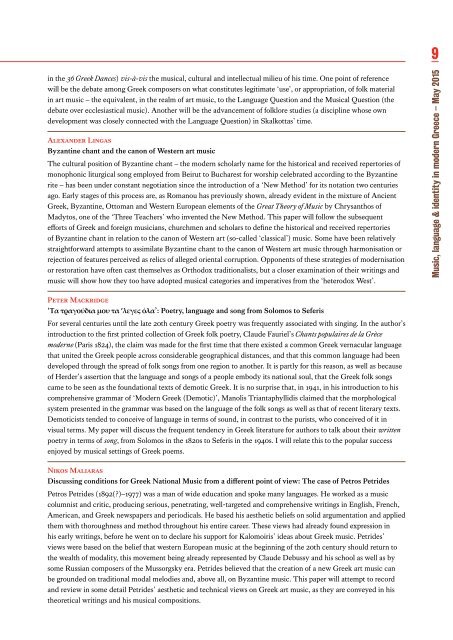Music,-language-and-identity
Music,-language-and-identity
Music,-language-and-identity
Create successful ePaper yourself
Turn your PDF publications into a flip-book with our unique Google optimized e-Paper software.
9<br />
in the 36 Greek Dances) vis-à-vis the musical, cultural <strong>and</strong> intellectual milieu of his time. One point of reference<br />
will be the debate among Greek composers on what constitutes legitimate ‘use’, or appropriation, of folk material<br />
in art music – the equivalent, in the realm of art music, to the Language Question <strong>and</strong> the <strong>Music</strong>al Question (the<br />
debate over ecclesiastical music). Another will be the advancement of folklore studies (a discipline whose own<br />
development was closely connected with the Language Question) in Skalkottas’ time.<br />
Alex<strong>and</strong>er Lingas<br />
Byzantine chant <strong>and</strong> the canon of Western art music<br />
The cultural position of Byzantine chant – the modern scholarly name for the historical <strong>and</strong> received repertories of<br />
monophonic liturgical song employed from Beirut to Bucharest for worship celebrated according to the Byzantine<br />
rite – has been under constant negotiation since the introduction of a ‘New Method’ for its notation two centuries<br />
ago. Early stages of this process are, as Romanou has previously shown, already evident in the mixture of Ancient<br />
Greek, Byzantine, Ottoman <strong>and</strong> Western European elements of the Great Theory of <strong>Music</strong> by Chrysanthos of<br />
Madytos, one of the ‘Three Teachers’ who invented the New Method. This paper will follow the subsequent<br />
efforts of Greek <strong>and</strong> foreign musicians, churchmen <strong>and</strong> scholars to define the historical <strong>and</strong> received repertories<br />
of Byzantine chant in relation to the canon of Western art (so-called ‘classical’) music. Some have been relatively<br />
straightforward attempts to assimilate Byzantine chant to the canon of Western art music through harmonisation or<br />
rejection of features perceived as relics of alleged oriental corruption. Opponents of these strategies of modernisation<br />
or restoration have often cast themselves as Orthodox traditionalists, but a closer examination of their writings <strong>and</strong><br />
music will show how they too have adopted musical categories <strong>and</strong> imperatives from the ‘heterodox West’.<br />
<strong>Music</strong>, <strong>language</strong> & <strong>identity</strong> in modern Greece – May 2015<br />
Peter Mackridge<br />
‘Τα τραγούδια μου τα ’λεγες όλα’: Poetry, <strong>language</strong> <strong>and</strong> song from Solomos to Seferis<br />
For several centuries until the late 20th century Greek poetry was frequently associated with singing. In the author’s<br />
introduction to the first printed collection of Greek folk poetry, Claude Fauriel’s Chants populaires de la Grèce<br />
moderne (Paris 1824), the claim was made for the first time that there existed a common Greek vernacular <strong>language</strong><br />
that united the Greek people across considerable geographical distances, <strong>and</strong> that this common <strong>language</strong> had been<br />
developed through the spread of folk songs from one region to another. It is partly for this reason, as well as because<br />
of Herder’s assertion that the <strong>language</strong> <strong>and</strong> songs of a people embody its national soul, that the Greek folk songs<br />
came to be seen as the foundational texts of demotic Greek. It is no surprise that, in 1941, in his introduction to his<br />
comprehensive grammar of ‘Modern Greek (Demotic)’, Manolis Triantaphyllidis claimed that the morphological<br />
system presented in the grammar was based on the <strong>language</strong> of the folk songs as well as that of recent literary texts.<br />
Demoticists tended to conceive of <strong>language</strong> in terms of sound, in contrast to the purists, who conceived of it in<br />
visual terms. My paper will discuss the frequent tendency in Greek literature for authors to talk about their written<br />
poetry in terms of song, from Solomos in the 1820s to Seferis in the 1940s. I will relate this to the popular success<br />
enjoyed by musical settings of Greek poems.<br />
Nikos Maliaras<br />
Discussing conditions for Greek National <strong>Music</strong> from a different point of view: The case of Petros Petrides<br />
Petros Petrides (1892(?)–1977) was a man of wide education <strong>and</strong> spoke many <strong>language</strong>s. He worked as a music<br />
columnist <strong>and</strong> critic, producing serious, penetrating, well-targeted <strong>and</strong> comprehensive writings in English, French,<br />
American, <strong>and</strong> Greek newspapers <strong>and</strong> periodicals. He based his aesthetic beliefs on solid argumentation <strong>and</strong> applied<br />
them with thoroughness <strong>and</strong> method throughout his entire career. These views had already found expression in<br />
his early writings, before he went on to declare his support for Kalomoiris’ ideas about Greek music. Petrides’<br />
views were based on the belief that western European music at the beginning of the 20th century should return to<br />
the wealth of modality, this movement being already represented by Claude Debussy <strong>and</strong> his school as well as by<br />
some Russian composers of the Mussorgsky era. Petrides believed that the creation of a new Greek art music can<br />
be grounded on traditional modal melodies <strong>and</strong>, above all, on Byzantine music. This paper will attempt to record<br />
<strong>and</strong> review in some detail Petrides’ aesthetic <strong>and</strong> technical views on Greek art music, as they are conveyed in his<br />
theoretical writings <strong>and</strong> his musical compositions.


